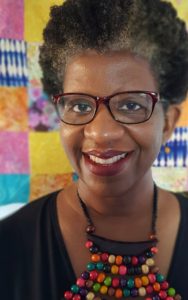
Dr. Marta Effinger-Crichlow is a theater scholar, filmaker, and author of Staging Migrations Toward an American West: From Ida B. Wells to Rhodessa Jones. To hear Dr. Effinger-Crichlow on a CUNY Podcast discuss her Staging Migrations book, click here. In that podcast interview Dr. Effinger-Crichlow described migrations as physical and symbolic and mentioned that she sometimes sees the world as a theater set. How people speak, perform, and gesture are of great interest to her. The Chair and Professor in the African American Studies Department at New York City College of Technology-CUNY reflected on her family’s participation in the Great Migration from a small town in Virginia to Washington DC in the early 1900s. Growing up in DC, she recalled as a child listening to her mother and aunts tell stories. She believes that the roots of her creative work have roots in her mother’s and aunts stories. She heard them talk about many things, from the Civil Rights leader, Rev. Dr. Martin Luther King Jr., to the riots that took place in DC following his assassination. She also heard about the migration– what it was like for her aunts and mother to leave their ancestral community Down South and adjust to a new city up North.
Asserting identity
Dr. Effinger-Crichlow remembers life lessons from her aunts about how to use your voice and set boundaries. She remembered feeling anxious during an instance in which her aunt was adamant about not letting strangers, especially white people, speak to her in a familiar way. Calling her out of her name, by her first name, or calling her ‘Auntie’ was not acceptable. Her aunt felt that they should use her full name and titles. “My aunt said: They don’t know you like that.'” Looking back today, she laughs about this with her sister. She said that her aunt’s tenacity taught her insights about gender and racial bias that Black women in America must navigate. She said observing her aunts taught her the significance of asserting who you are and not letting others change or steal your identity or name from you.
Feels like a weight
As an auntie herself, she appreciates and honors the responsibilities of teaching values, family history, and local Black history that her aunties passed on to her. She is grateful to carry the legacy of how far generations of women in her family have come, especially as Black women who, she says, are often expected to fix and make everything right for everyone. While she says it often feels like a weight to carry on this legacy of Black excellence that Black aunts are known for. But she makes sure to remember: “Black excellence is about community and people.”
‘Womb circle’
She hopes to pass on this lesson to her nieces and nephews as well as daughters and essentially continue a “womb circle,” which she says is about protection and feeling like you belong. “A womb circle is kind of like a shield that will be with you no matter what.” This is a specific feeling. She said she traced this feeling back to her aunties growing up. “My aunts made sure to always look after me and welcome me with open arms.” As an auntie, she hopes she can ensure that her nieces and nephews feel like they belong someplace and to their people. She says that as their aunt, she is a part of that belonging and thankfully she is not the authority figure. Instead, she can offer support, positive influences, and unconditional love.
Painful losses
In 2020, Dr. Effinger-Crichlow’s mother and two aunts passed away – one in each month: February, March, and April. Those losses were painful. It stung coming to terms with the realization that their passing meant the loss of one entire segment of her mother’s line and the generation who were part of the Great Migration. She wishes now she had taken more time to ask questions for her own growth. However, she recognizes her mother’s family generation held onto secrets like no other generation. Laughingly, she said: “That generation went to their grave with secrets.”
Honoring humility
One pressing question she wished she had an answer to as a child, though she doesn’t need that now, was a clearer understanding of how to navigate relationships and the importance of being humble. She says her family’s badge of honor growing up was humility. Though she didn’t really understand why. She came into conflict with this when navigating through the world and realizing not everyone is humble. Eventually though, she came to figure out why it was so important to be humble. This is a value that has stuck with her to this day. She admits she doesn’t use her titles ‘Professor” or “Dr.” identity outside of her academic circle despite popular support for her to “brag about” these tremendous accomplishments.

Aunts, mother’s influences
Dr. Effinger-Crichlow sees her aunts and mother’s influence on her professional work life. Her home life has certainly influenced her work such as her artistic projects, teaching, and scholarship. Amongst the many things she is thankful for, she is grateful to be able to trace her creative trajectory and continue to inspire Black women-centered communities through her reflection and lived experiences that have manifested in her work. She is happy with her accomplishments as a sister, friend, and artist, whether it brings joy or inspires folks to engage in activism.
Full of layers
Dr. Effinger-Crichlow’s lived experiences have certainly informed her perspective on her mother and aunts as well as her professional work. They have certainly influenced her understanding of identity and how complex it can be. Today she sees her aunt and mother as women – beautiful and full of mystery. She also recognizes her mother and aunt’s entire identities are not connected to who she is entirely. She is full of layers, to which she makes a point in how she approaches her work – to rely on all her layers. “At the end of the day perfection is overrated. And that’s the way I think about Black Excellence. I don’t think that’s exactly the same as perfection.”
Career highlights
Marta Effinger-Crichlow, Ph.D is the author of Staging Migrations Toward an American West: From Ida B. Wells to Rhodessa Jones by University Press of Colorado. Her other writings are included in African American Lives, Theatre Journal, African American Review, Footsteps: Children’s Magazine, Journal of Black Studies, and the Dictionary of Literary Biography. Effinger-Crichlow is also a dramaturg, playwright, and filmmaker. Produced works include the multi-media collage The Kitchen is Closed Startin’ Sunday and Whispers Want to Holler, which included a collaboration with noted jazz saxophonist Billy Harper. She served as the project director and co-investigator for CityTech’s first ever National Endowment for the Humanities (NEH) grant project entitled Retentions and Transfigurations: The Technological Evolution and Social History of Five New York City Neighborhoods. This NEH funded faculty development initiative was designed to strengthen teaching of humanities within technical and professional studies programs. In 2014, The Network Journal, which recognizes “Black women leaders and influencers in every field,” selected Effinger-Crichlow as one of their “25 Influential Black Women in Business.”
Effinger-Crichlow has been an invited lecturer at The Rosie the Riveter Museum of the National Park Service in Richmond, CA; Syracuse University; The CUNY Graduate Center; The African Burial Ground Museum and Monument of the National Park Service in New York City; Lane College’s NEH Summer Institute in Eugene, OR; and Xiamen University in China. In 2015, she appeared on TEDx CUNY at the TriBeCa Performing Arts Center in New York City. She was a 2017 IFP JustFilms Fellow at the Made in NY Media Center and is a Women Make Movies Production Assistance Program recipient for her documentary film project LITTLE SALLIE WALKER. It tells the story of a diverse group of black women and girls who depend upon childhood play to survive girlhood and even womanhood in America.
